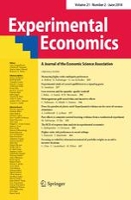Using an appropriation game setting, we examine individual responses to changes in a groups’ vulnerability to a probabilistic loss (L) of a public good. The probabilistic loss parameter entails losing 10, 50 or 90% of the value of the public good that is maintained through cooperation, where the likelihood of the loss decreases in total group cooperation. By design, the expected marginal net benefits to an individual and the expected harm to others depends endogenously on the individuals’ expectations of group cooperation and exogenously on the magnitude of the loss parameter. We find that individual cooperation is greater when forecasts of total group cooperation are greater and where the magnitude of the probabilistic loss is larger. There is, however, an interesting asymmetry in responses by two subgroups. Subjects who are pessimistic regarding total group cooperation decrease cooperation the higher the magnitude of the probabilistic loss and their decisions are tied systematically to changes in their expectations of other’s cooperation. On the other hand, subjects who are optimistic regarding total group cooperation are found to be more cooperative, but their decisions are not systematically tied to changes in expectations of others’ cooperation.
Externalities in appropriation: Responses to probabilistic losses
Externalities in appropriation: Responses to probabilistic losses
- James M. Walker, Blanco E., Haller T.
- Publication Date
2017 - Website
- View publication information
 The College of Arts
The College of Arts